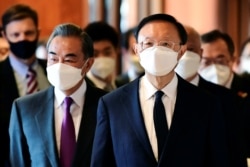U.S. Secretary of State Antony Blinken said the United States shared “significant concerns” with China during the first face-to-face meeting between the two countries under the Biden administration, concluding two days of contentious talks.
Blinken said the U.S. diplomats "knew going in that there are a number of areas where we are fundamentally at odds, including China's actions in Xinjiang, with regard to Hong Kong, Tibet, increasingly Taiwan, as well as actions that it's taking in cyberspace."
He told reporters at the conclusion of the talks Friday in Anchorage, Alaska, "We wanted to share with them the significant concerns that we have about a number of the actions that China has taken and the behavior it's exhibiting, concerns shared by our allies and partners."
“And it's no surprise that when we raise those issues clearly and directly, we got a defensive response,” he added.
Indeed, a few hours before the talks began, Zhao Lijian, a spokesperson for the Chinese Foreign Ministry in Beijing, made that clear.
“China has no room for compromise on issues concerning its sovereignty, security and core interests. Our determination and will to safeguard our own core interests are unswerving," he said.
The Chinese delegation, headed by Communist Party foreign affairs chief Yang Jiechi and Foreign Minister Wang Yi, left the talks Friday without making a statement.
Blinken said that despite the difficulties, the two sides were also able to have a “very candid conversation” on topics where their interests intersect, including Iran, North Korea, Afghanistan and the climate.
U.S. national security adviser Jake Sullivan said, "We expected to have tough and direct talks on a wide range of issues and that’s exactly what we had."
During the opening of the talks on Thursday, officials from both countries traded barbs.
Blinken said China’s actions in Xinjiang, Hong Kong and Taiwan along with carrying out its cyberattacks and economic coercion “threaten the rules-based order that maintains global stability.”
Yang responded with a 15-minute speech in which he accused the United States of pushing its own version of democracy at a time when the country was struggling with democracy itself.
“We believe that it is important for the United States to change its own image and to stop advancing its own democracy in the rest of the world,” Yang said. “Many people within the United States actually have little confidence in the democracy of the United States,” he added.
Blinken then retorted that officials in Japan and South Korea, which he recently visited, seemed to have a positive impression of the Biden administration.
“I’m hearing deep satisfaction that the United States is back, that we're reengaged,” Blinken said. “I’m also hearing deep concern about some of the actions your government is taking.”
Ahead of the meeting in Alaska, Blinken traveled to South Korea and Japan along with U.S. Defense Secretary Lloyd Austin.
“The United States is now making a big push to revitalize our ties with friends and partners,” Blinken and Austin said in a piece published in The Washington Post on Monday before they set off on their trip.
The two officials said they chose Asia as their first overseas trip because “the Indo-Pacific region is increasingly the center of global geopolitics” and they singled out China as a country that seeks to “challenge the international order” in the region.







